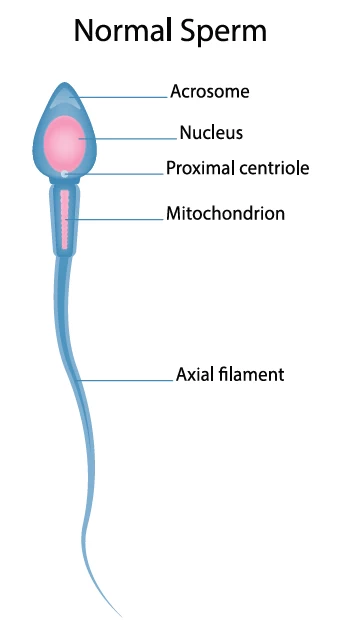
Revised 2023

How is male fertility tested?
The most common male fertility test is a semen analysis. This test measures many qualities of the sperm and semen (the fluid in which the sperm are contained). The most important of these are the sperm count (number of sperm), motility (percentage of moving sperm), morphology (percentage of normally shaped sperm), and the ejaculate volume.
How is morphology assessed?
To assess sperm morphology, the sperm are examined under a microscope and the percentage of abnormally shaped sperm is reported. It is important to know that all male patients produce abnormal sperm and as many as half of the sperm in a “normal” semen sample are abnormally shaped.
Sperm morphology is assessed using one of 2 sets of characteristics. Kruger criteria are strict and consider minute irregularities as abnormal. World Health Organization (WHO) criteria are more lenient and do not classify as many sperm as abnormal. It is important to know which criteria are used since normal ranges can be different.
 What is a morphologically-normal sperm?
What is a morphologically-normal sperm?
A normally shaped sperm has:
- A smooth, oval-shaped head of a certain size (less than the size of a needle point)
- A well-defined cap (acrosome) that covers most of the sperm head
- No visible abnormality of neck, midpiece, or tail
- No significant fluid droplets in the sperm head
Can an abnormally shaped sperm fertilize an egg?
Yes, it can. Some patients with abnormally shaped sperm may have no trouble causing a pregnancy. However, having a higher number of abnormally shaped sperm has been associated with decreased fertility in studies. Usually, higher numbers of abnormally shaped sperm are associated with other sperm irregularities such as low count or motility.
If an abnormally shaped sperm can fertilize an egg, why does the shape matter?
No one is exactly sure why the sperm shape matters. Patients with abnormally shaped sperm tend to have more trouble causing a pregnancy, but we cannot say for sure whether that difficulty is caused by the shape of the sperm itself or by other abnormalities with the sperm or semen. If planning in vitro fertilization (IVF), intracytoplasmic sperm injection may be recommended if morphology is low since it is more successful than classic IVF.
If an abnormally shaped sperm fertilizes the egg, does that mean that my child will have a higher risk of genetic abnormalities?
There is no known relationship between the shape of a sperm and its genetic material that are passed to offspring. However, some abnormalities in sperm shape may be the result of genetic disturbances, so there is a chance that male offspring could inherit the same type of morphology abnormalities that are found in their fathers’ sperm.
Is there anything I can do to improve the shape of my sperm?
Research has not shown a clear relationship between abnormal sperm shape and most lifestyle factors. In an effort to improve sperm parameters, your physician may still recommend moderating alcohol and caffeine use and limiting any tobacco use. Tobacco and many recreational drugs may harm sperm DNA (material that carries your genes), so these substances should be avoided while trying for a pregnancy. It may take up to 3 months for any sperm changes to improve after altering lifestyle factors.
Are there any dietary supplements or vitamins that I can take to improve morphology?
Dietary supplements or vitamins have not been definitively shown to improve sperm morphology or male fertility. Some specialists recommend that you take a daily multivitamin with antioxidants regardless given the potential of improving reproductive health and minimal risk.
Sperm
Male Fertility/Andrology
Fact Sheets/Booklets
View more fact sheets and booklets written by the ASRM Patient Education Committee.
Menopausal Transition (Perimenopause): What Is It?
The menopausal transition (perimenopause) is the period that links a woman’s reproductive (childbearing) years and menopause.
Osteoporosis
Osteoporosis and osteopenia are conditions of having low bone mass (density).
Hyperprolactinemia (High Prolactin Levels)
Prolactin is a hormone produced by your pituitary gland which sits at the bottom of the brain.Find a Health Professional












